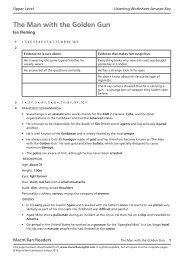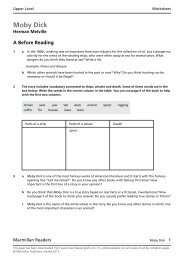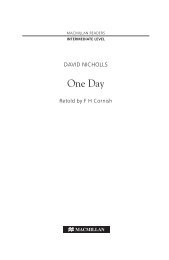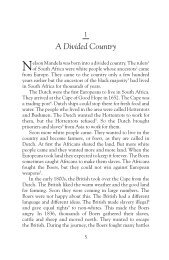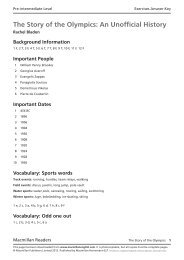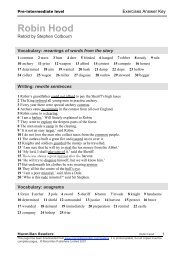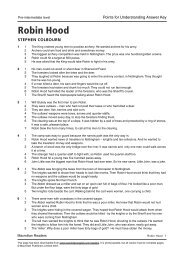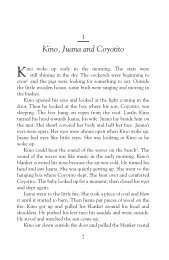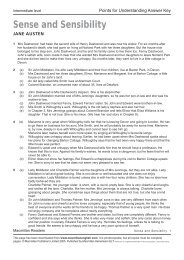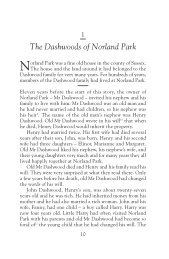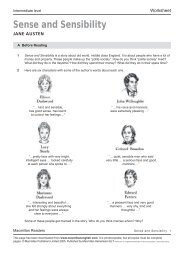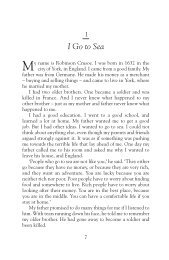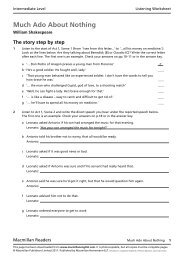Moby Dick Further Study Questions - Macmillan Readers
Moby Dick Further Study Questions - Macmillan Readers
Moby Dick Further Study Questions - Macmillan Readers
You also want an ePaper? Increase the reach of your titles
YUMPU automatically turns print PDFs into web optimized ePapers that Google loves.
<strong>Further</strong> <strong>Study</strong> <strong>Questions</strong> Answer key Upper<br />
The Rose-bud<br />
The captain of the Rose-bud is inexperienced and doesn’t realise that dead whales don’t contain any<br />
useful supplies of oil. He is insisting that the men put up with the terrible smell and try to extract oil<br />
just the same. The seamen are sick of the smell and want to get rid of the whale, but the captain will<br />
not listen to reason (in this way he is similar to Ahab, an unreasonable captain that pushes his crew<br />
into suffering conditions they are not happy with).<br />
a The encounter teaches us a lot about the products of whaling, about the competitive nature of the<br />
job and about how important experience is.<br />
b The French sailors have not heard of <strong>Moby</strong> <strong>Dick</strong> and no information is exchanged.<br />
The Samuel Enderby<br />
The captain of the Samuel Enderby contrasts strongly with Ahab. Both men have lost limbs because of<br />
the white whale, but their attitude to their loss is completely different. The Englishman doesn’t want<br />
revenge, he is glad that he escaped with his life and is not interested in hunting <strong>Moby</strong> <strong>Dick</strong> any more.<br />
He thinks that Ahab is mad to go after him.<br />
a The encounter doesn’t really teach us anything new about whaling ships, except that it is a hard<br />
life, with ships’ doctors treating patients in extreme circumstances.<br />
b The English captain describes <strong>Moby</strong> <strong>Dick</strong> as an enormous whale, bigger than any other whale he’s<br />
ever seen, strong and impossible to catch as well as dangerous to hunt. He says that <strong>Moby</strong> <strong>Dick</strong><br />
plans his attacks on ships. The story adds to the myth growing around the figure of the whale.<br />
The Bachelor<br />
The crew of the Bachelor, including the captain, are all celebrating their good luck. They are singing<br />
and dancing and drinking. Their journey has been very successful and they will soon be home. This is<br />
how life could be for the seamen on the Pequod if their captain was not so obsessed with chasing the<br />
white whale. This is the happy return home that they will never see.<br />
a We learn about the importance of taking home as much sperm oil as possible, the custom of picking<br />
up islanders from Polynesia and the festive atmosphere of a successful journey.<br />
b The captain has heard of the white whale but he has not seen him, and doesn’t want to. This<br />
attitude may be part of the ship’s good luck. They are not interested in myth or superstition, only in<br />
finishing their job and getting home to celebrate.<br />
The Rachel<br />
The Rachel has seen <strong>Moby</strong> <strong>Dick</strong> the day before. The crew need Ahab’s help, but he is too obsessed with<br />
the idea of chasing <strong>Moby</strong> <strong>Dick</strong> to stop.<br />
a More details about the dangerous work of whaling, of how ships get lost and the story of the<br />
captain’s boy shows us how this hard, dangerous life is shared by boys as young as 12 years old.<br />
b The whale is getting nearer and more real, and so is the danger. The boat that chased <strong>Moby</strong> <strong>Dick</strong><br />
has been lost. There’s no clue as to what might have happened to it. The suspense and thrill of the<br />
chase, and the general sense of urgency, is growing.<br />
<strong>Macmillan</strong> <strong>Readers</strong> <strong>Moby</strong> <strong>Dick</strong> 4<br />
This page has been downloaded from www.macmillanenglish.com. It is photocopiable, but all copies must be complete pages.<br />
© <strong>Macmillan</strong> Publishers Limited 2009. Published by <strong>Macmillan</strong> Heinemann ELT. Heinemann is a registered trademark of Pearson Education, used under licence.



